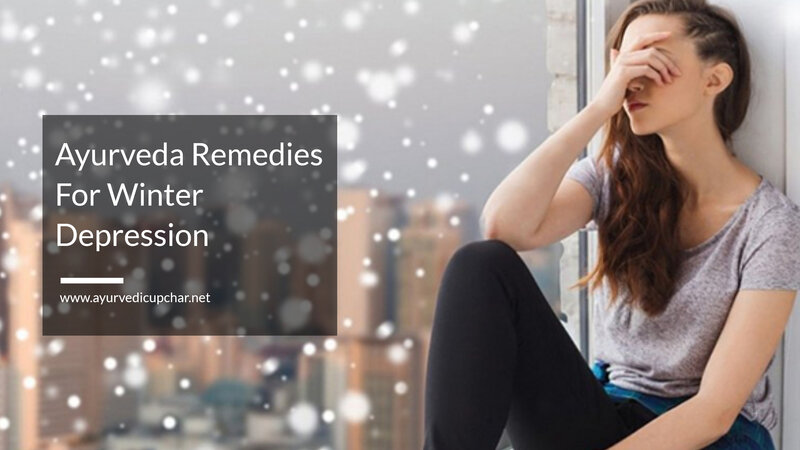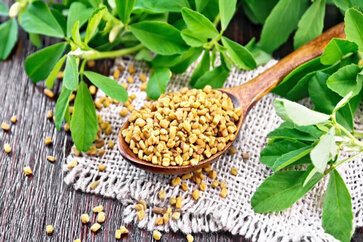Ayurveda Remedies For Winter Depression
 Long nights, short days, sweaters, warm clothes, and chilly weather make many of us sick and depressed. This depression which surfaces especially in winter is a Seasonal Affective Disorder (SAD) and is often called winter Time Blues or Winter depression.
Long nights, short days, sweaters, warm clothes, and chilly weather make many of us sick and depressed. This depression which surfaces especially in winter is a Seasonal Affective Disorder (SAD) and is often called winter Time Blues or Winter depression.
The exact cause of this depression is as of yet unclear. But yet few scientists believe lack of exposure to sunlight is the reason for this disorder. The symptoms of winter depression are a tendency to overeat, craving for carbohydrates and sweets, and weight gain.
Had our ancestors observed this change in humans?
The answer is yes. Have they recommended any remedies? Yes, they have recommended simple and effective natural remedies to overcome Seasonal Affective Disorder.
They have laid down explicit guidelines about diet and lifestyle which have to be followed according to seasons. The winter season is marked as Hemanta Ritu and Sisira ritu in Ayurveda. Hemanta ritu starts in mid-November and ends in mid-January.
This falls on the southern solstice which is called visarga Kala or dakshinayana in Ayurveda. Sisira ritu starts in mid-January and lasts till the middle of March. Sisira ritu falls in Northern solstice which is called Aadana kaala or uttaraayana.
Causes of winter depression
The main causes of depression in winter are well known.
1. Lack of sunlight: When exposed to sunlight, our skin produces vitamin D, which is involved in many metabolic processes. In winter, there are few sunny days, and the length of the day is reduced, in addition, the skin is constantly covered with clothes. Instead of vitamin D, the body produces more melatonin, the sleep hormone, which makes us want to spend more time in a state of drowsiness.
2. Monotonous food: Not everyone can afford to buy greenhouses or exotic vegetables and fruits, and the set of useful substances in them is not particularly rich. The body does not receive the necessary vitamins and minerals from food.
3. lack of movement: In winter, our physical activity is noticeably reduced. Because of the bad weather, we rarely go outside, and if we do go out, we prefer to travel by transport rather than on foot.
Ayurveda tips for winter
The response of the human body to this season is very well explained in Ayurveda. People will have increased strength and their digestion capacity is increased. This is marked by increased hunger.
These symptoms are caused by increased body fire which is supported by vata. Vata inside the body increases in winter because of cold and dryness which is prevalent in the outer atmosphere.
The wintertime depression is noticed mostly in persons who have vata as a major constituent in their Prakriti or body constitution. The cause for this type of change is longer nights in winter.
- Light therapy: It is recommended by doctors for wintertime blues. Exposure to artificial light may cause headaches, Irritability, Eye strain, Inability to sleep, and fatigue. Exposure to sunlight and if sunlight is not available sitting near the fireplace is the remedy suggested in Ayurveda.
- Keeping the home well-lit with lights: It helps to reduce the intensity of depression.
- Moderate exercise like yoga: It is another remedy for winter depression. Ayurveda recommends oil massage (abhyanga) to the body and head (moordha taila.). Indulging in a sexual act to keep the moods elevated and to keep the body warm is another strongly suggested ayurvedic remedy.
- Meeting friends: The friend who is kind and understanding boosts morale and brightens up the day. Spending time with friends on the beach helps to expose your body to sunlight and keeps your spirits high.
- Other ways: Relaxing with meditation, massage, light music, and laughter helps to a great extent.
The following ayurvedic tips help to prevent and reduce the intensity of the seasonal disorder of winter, the wintertime blues.
- Expose yourself to sunlight as much as you can.
- In absence of sunlight sitting near the fireplace is very helpful.
- Massage your body with vata-balancing herbal oil (abhyanga). Never forget to apply oil on your head (moordha taila.). Then remove the oil by taking a hot water bath.
A mixture of flours of yellow gram (channa), green gram (moong), and fenugreek seeds (methi) in equal proportion is the best herbal scrub that can be used to remove the oil. This mixture prevents the washing of natural oil from the skin.
- Consume hot soups.
- Use vata-balancing foods like wheat, oil, corn, black gram, and jaggery.
- Tickle your taste buds with sweet, sour, and salt tastes
- Always use hot water for all daily routine activities.
- Use thick blankets and sheets made of cotton, silk, and wool.
- Always wear footwear.
- Indulge in the sexual act.
- Spend your leisure time with friends and relatives whom you like.
How to restore good health
It is possible and even necessary to fight winter depression, and this does not require expensive funds and enormous efforts. First of all, you should overcome laziness and drowsiness by forcing yourself to walk more often, walk, go to the skating rink, go skiing, or just go sledding with the whole family. Trampoline sections, fitness clubs, swimming pools – all this and much more will help you keep yourself in good shape.
Diversify your diet as much as possible to include more fruits and vegetables. If there are no fresh ones, sauerkraut, homemade and purchased pickles and urine, frozen vegetables are suitable. In addition, in winter, the use of pharmacy vitamins and mineral complexes becomes inevitable.
Another important component of a good mood is live communication. An evening spent in the company of friends will be much more useful than sitting on social networks. And, of course, you should avoid negative emotions and stress, as well as effectively deal with their consequences. Soothing herbal teas will help with this, which will not only put the nervous system in order but also provide additional vitamins.























